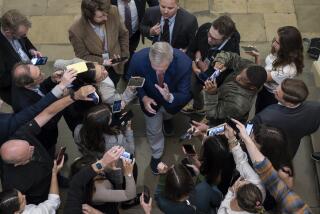Liberals, Conservatives May Join to Fight Common Foe--Bureaucrats : Soviet Union: Both the reformers and the conservatives fear the party apparatchiks, who are seen as power hungry.
- Share via
MOSCOW — Western-style reformers and ultra-Marxists, both alarmed by the mounting and venomous attacks of mid-level Communists on President Mikhail S. Gorbachev’s leadership, moved Wednesday to forge an odd-couple alliance at the party congress to prevent a takeover by bureaucrats.
“Apparatchiks spit on ideology; all they care about is power,” Leningrad progressive and congress delegate Yuri Boldyrev said when asked how the extremes on the Communist left and right could suddenly contemplate coming together. “But we can find a common language with the Marxists, because they believe in something.”
After a rhetoric-filled day in the Kremlin that saw the fruits of Gorbachev’s reforms come under withering and occasionally mocking criticism from provincial party functionaries, members of the ultra-orthodox Marxist Platform and the radical Democratic Platform scheduled a meeting to discuss the possibility of joint strategy.
The evening caucus in a Kremlin hall had the apparent blessing of Gorbachev, since his ally, Politburo member Alexander N. Yakovlev, accepted an invitation to attend, said Democratic Platform member Klara L. Golitsina, director of a cotton mill in Ivanovo.
Gorbachev and his supporters have frequently expressed their worry over the danger of “conservative” delegates dominating the 28th Communist Party Congress and forcing a halt or a backtracking in the perestroika reforms.
They have clearly not meant the Marxist Platform delegates but the city- and republic-level party and government bureaucrats who make up a majority of the congress delegates--and who often have a vested interest in resisting or braking the changes advocated by the leadership.
David N. Kugiltinov, a writer from the Kalmyk region, told the congress on Wednesday that the commission created the previous day to review proposed new statutes for the party has so many full-time party functionaries on it, as opposed to ordinary Communists, that it is a “seminar of secretaries.”
Viewed from the balcony, the party congress seems a veritable sea of men in their late 40s or 50s wearing blue-gray suits, the uniform of the Soviet apparatchik.
Golitsina said the goal of participants at Wednesday’s meeting was the creation of a “Democratic Unity” group, merging members of the two platforms as well as delegates from Komsomol, the Young Communist League, along with grass-roots party officials from urban neighborhoods who are often hostile to the domineering control exercised by superiors.
Democratic Platform members said the anti-bureaucracy bid had especially strong support among lower echelon party workers in Moscow, Leningrad and the industrial cities of Sverdlovsk and Kuybyshev. They said that Russian Federation President Boris N. Yeltsin, an enemy of the party apparat, had promised his support.
“There’s a lot of good in the Marxist Platform,” said Nikolai Shcherbina, a member of the radical faction from Kiev. “The only difference between us is that the Marxist Platform wants to return to Marx, and we want to draw our ideas from everyone, including the bourgeois philosophers.”
Golitsina acknowledged, however, that the unity bid “is a big question mark” since little unites the two platforms except their members’ common hostility to the party powers that be. The Democratic Platform has 100-odd of the nearly 4,700 congress delegates, and some have already refused to make common cause with the Marxists.
On Wednesday, the frustration of those on the two wings of the party at the course taken by the congress was clear.
“We need real collective leadership that can express all platforms,” Muscovite Alexander V. Vuzgalin said after he tried to present the details of the platform to the congress but was not given the floor.
Vladimir Polokhalo, who wears the red plastic lapel button of a Democratic Platform delegate, said the fusion of members from the two movements “would naturally be against the bureaucracy.” But it was immediately obvious that Polokhalo’s colleagues, who renounce even the formal goal of building communism, and their Marxist comrades, seeking an ideological rollback to the pre-Gorbachev ideas of the 1970s, would make strange political bedfellows.
As members of both groups chatted with a journalist in the lobby of the Kremlin Palace of Congresses, their dramatically different points of view were glaringly obvious. For Vladimir P. Gvozdyrev, a Marxist Platform delegate and neighborhood party chief in the Siberian city of Novosibirsk, Yakovlev is a virtual “Judas” who has betrayed Communist Party beliefs and interests.
Some Democratic Platform members, however, express hope that Yakovlev, considered the architect of many of Gorbachev’s reforms, will become the next leader of the Soviet Communist Party.
More to Read
Sign up for Essential California
The most important California stories and recommendations in your inbox every morning.
You may occasionally receive promotional content from the Los Angeles Times.













